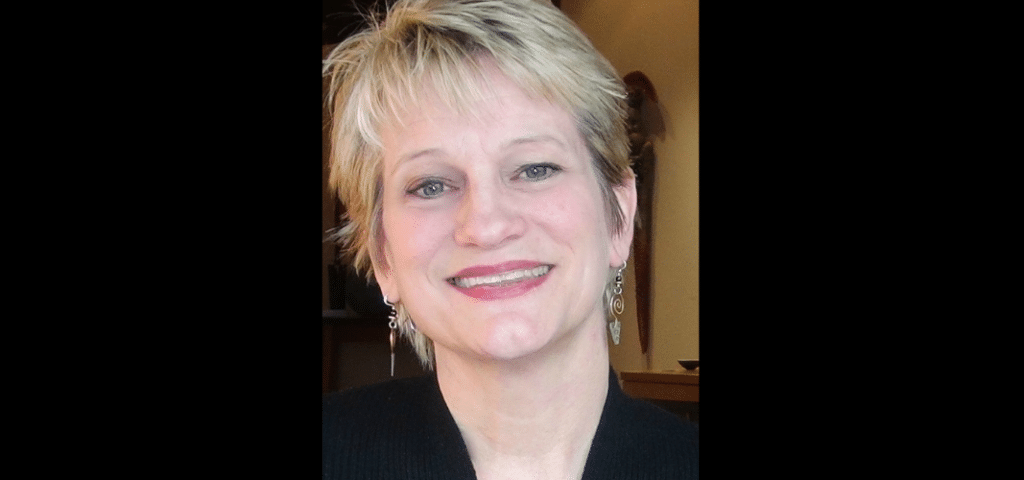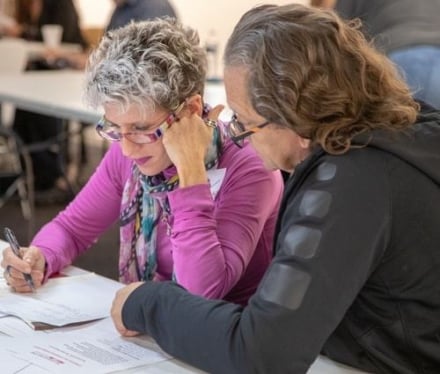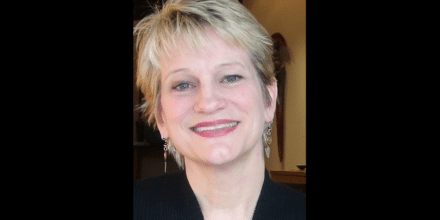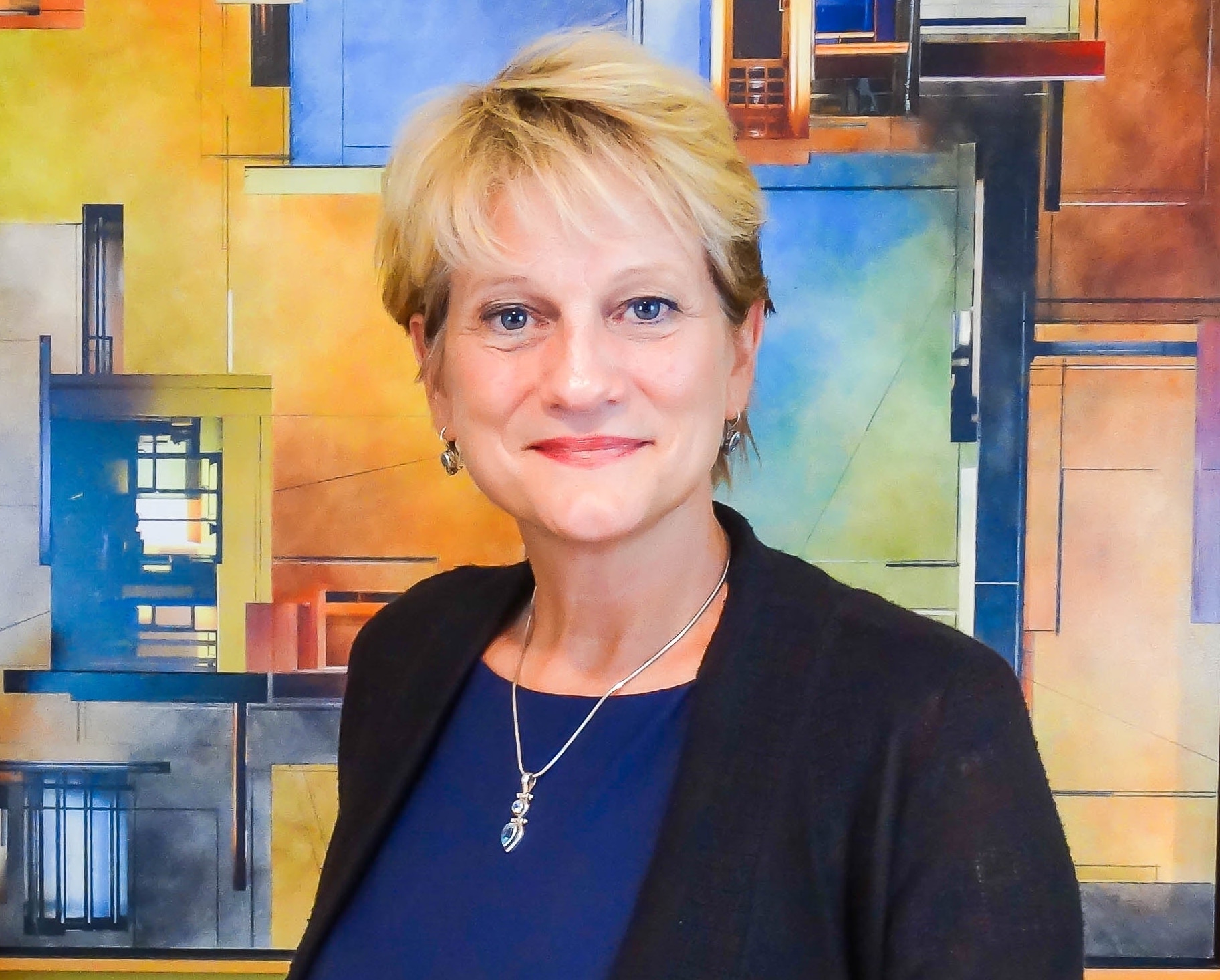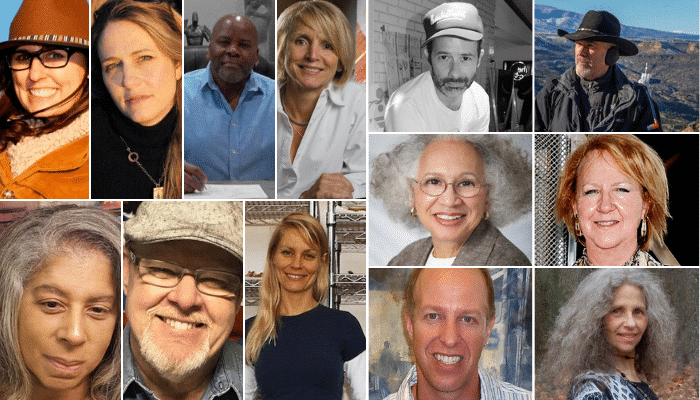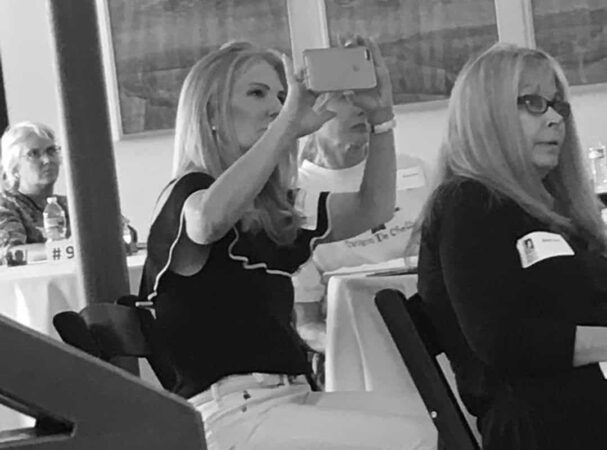In the second episode of this two-part podcast, Carolyn Edlund weighs-in on how artists can shift their sales strategies and build an art business that will weather these tough times, as well as being resilient to future changes. Contrary to popular belief, collectors are buying art right now, and artists can zoom in on their relationships, update their platforms, and define or redefine their target markets to make this work in their favor.
Carolyn is Sales & Events Director at CHF and our faculty subject matter expert on Sales Strategy. She is the founder of ArtsyShark—and brings a background as an artist, former ED of the Arts Business Institute, years in art-publishing and licensing, and extensive experience in curriculum development and seminars for artists. Work with Carolyn & the CHF Faculty online at the Virtualize Your Art Career TM Conference October 19-30.
What a Sustainable Art Business Looks Like In Today’s Environment
- “There are opportunities to really grow your business. I’ve spoken to several artists lately who are making more sales than ever before. Now, how in the world is this happening? I’m sure you’re thinking, ‘What!? Who’s doing that?’ The artists who are making these sales have given some deep thought to how they are going to go virtual with their marketing and sales strategies. And they’re going 100 percent in that direction, using tools online that are helping them reach an audience who is actually very hungry to buy right now.”
- “Everybody is sitting at home, people are bored, they’re shopping and they are buying art. We know that’s happening. We know there has been an uptick in art sales. So the people that I see who are succeeding—when I get down into the weeds with them, like, ‘What are you actually doing?’ It turns out that they’ve got systems built into their business that are very methodical for drawing an audience, introducing them to their work, getting them with a hook, and then selling their work. And then selling more work to them. They’re building a very sustainable business with repeat sales, which is what we want to do in any environment. It is possible to do that during a pandemic.”
Leverage Your Art and Your Collectors For That Repeat Sale
- “I love repeat sales because it’s easier to sell to an existing customer. They’re the foundation for an ongoing business—where you have existing sales that happen again and again. Part of that is leveraging the work that you sell. I talk about that when I teach sales strategy, and I’m going to be talking more about that in our conference: are you leveraging your collector by selling to them over and over? Are you leveraging your work by selling the next piece in a set? It’s a way of thinking: what do I have that’s going to appeal to people? What can I offer them if I want to keep them as customers, and as eager customers, who will want to own more of my work?”
Embrace Your Power as an Individual Artist
- “The market has evolved over the last 20-25 years toward the empowerment of the individual artist. We’ve seen it in other industries. If we look at, for example, the movie industry, back in the day the studios owned all the actors and they would say, ‘You’re doing four movies this year,’ or ‘I’m going to loan you out to Warner Brothers.’ And they would direct the career of the ‘stable’ of actors that they would control. Nowadays, we see actors who are now directing their own production companies. They have their collaborations. They are free, they are empowered. They can do the projects that they choose to do and they’re setting their own career paths. Visual artists are in much the same position. It is not always emotionally easy to step up and say: ‘Yeah, I’m going to be the CEO of my own art business.’ It might be your personality to say, ‘Gee, you know, I wish somebody else would just sell for me.’ But there are advantages to being forced as an artist in this day and age to realize that you have a certain amount of responsibility. You’re the one who has to make the decisions, and there is no one who can replace you in knowing what you want and to be able to tell your story the way that you can.”
Stay Informed with Professional Development
- “Anyone in business can definitely benefit from experts—whether they have something that’s specifically useful to you, or you just want to hear about the industry. Think of someone like a real estate agent. They could be in business for 20 years, and yet they’re still getting training, or reading a blog, or listening to a podcast that’s going to give them really interesting strategies about how to connect with their customers or help their sellers. What’s new in the industry? What are people talking about? What are the trends? And so you really need to stay up to date with it. It’s part of professional development.”
Art vs Sneakers: The Collector’s Emotional Connection
- “A lot of artists who are making sales have put systems into place that work. And it’s not unique to art. You could be selling shoes, and you could be doing a really good job of it because you understand the strategies of how to market and sell successfully online. It’s really no different. But I think that art—I mean, at least in my mind—is very special. You can’t exactly equate it to a pair of sneakers. Art is something that people have an emotional connection to. An artist is a very special kind of person: your creativity is so important in the world, that in my mind, it’s at a higher level and it’s really treasured. Collectors want to grab the art if you’re running out of your home in a fire. You grab the art you love because it’s so important to you.”
Reclaim Your Confidence at the CHF Virtualize Your Art Career TM Conference
- “What would I really like to see an artist come away with? Confidence. I would like an artist, especially if they’re having a difficult time trying to decipher what to do in these times, this pandemic time—I’d like for them to understand that it is possible, that you can build a business. This is a hard time because life will always have hard times. We will go in and out of recession. There will be changes of all types, that’s just part of the world. So can they be successful no matter what? Yes. And I’d like people to understand that other artists are doing this. I’d like them to feel the support of a community. You brought up the emotional factor earlier: that is such an important part. When you know you can do it, when you know you’ve got your network of artists who’ve got your back, and when you know that you can follow a plan that is solid and makes sense, then it gives you a starting point to just take that first step, right after the conference. You can start following that roadmap and start realizing your goals and working towards those objectives. And if you stay with it and you are consistent and persistent, then you will make sales and you will move your art business ahead.”
Listen to Part I of this two-part episode with Carolyn Edlund! Move the needle for your art business, feel the support of your community, and learn with Carolyn and the CHF Faculty: register for our Oct 19-30 online Virtualize Your Art Career TM conference here.
Jerry’s Artarama supports CHF and this episode of The Thriving ArtistTM podcast.

